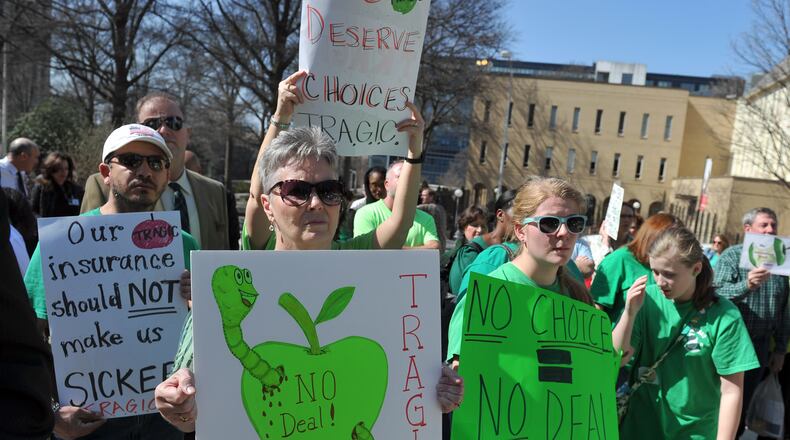Georgia has really expensive health insurance for its teachers compared to teachers in other states. Georgia's teachers make more money than teachers in those same states.
Both of these statements are true, but only one of them has gotten any attention lately.
Earlier this year, legislators who had grown tired of being blamed for that really expensive health insurance asked for a review of the State Health Benefits Plan to find out why it was, well, really expensive. That study is complete , and it's being cited by some teachers as evidence that -- you guessed it -- their health insurance is really expensive.
What the consultants at Aon Hewitt found is that employees covered by the SHBP (for simplicity's sake, I'm going to refer to them hereafter just as "teachers," even though many of them are not teachers) pay more for both premiums and out-of-pocket costs than their peers in Florida, Kentucky, Mississippi, South Carolina and Tennessee, as well as those covered by the University System of Georgia's plan. The total costs, including the employer's share, are also higher in Georgia, but the consultants also found that almost all of this difference can be explained by geography, demographics, and the number of adults (vs. children) covered by the plan. After adjusting for those factors, the study concluded, Georgia's total costs "are lower than all but two Comparators, and are 1 percent lower than the mean." That puts the findings in a rather different light.
As for teachers' share of the costs, missing from the study is how the salaries of Georgia's teachers stack up to their peers in other states. I looked up salary data for teachers* in the six states (though not USG employees) reported by the Bureau of Labor Statistics and compared them to the study's data for how much teachers in each state contribute each month toward their health-insurance premiums. My findings are in these graphs:
and
As you can see, whether we are talking about plans for single employees or their families, and whether in either case the cheapest or most expensive plan is chosen -- in every instance, the average Georgia teacher has more money left over after those contributions than her peers in any of the states Aon Hewitt studied.
Keep in mind, I've only taken account here of payroll deductions for the premiums, not out-of-pocket costs, which Aon Hewitt said were also higher in Georgia. However, the after-deduction income for Georgia's average teacher is $650 to $2,864 more per year than the closest state, depending on which of the four measures you look at. The study put the additional cost at 22 percent higher than average, so if a Georgia teacher's out-of-pocket spending is more than, say, $3,000 a year, it's possible that margin would be wiped out. But even then, that Georgia teacher would merely be even with teachers from the second most highly paid state, and still better off than the teachers in the other four states.
The bottom line: There are two separate issues here. First, does the SHBP cost too much overall? The study provides some evidence that's the case, as well as some suggestions for reducing the cost -- from better use of telemedicine and on-site clinics to narrower provider networks. And it may well be true that the state still hasn't gotten the right mix of plans in its insurance package. If the state can do more to get those things right, it should. (It is worth saying here that I did not look at salary data for SHBP workers other than teachers, nor for retirees. While I tried to look at the aspect of the plan that gets the most scrutiny, this is not an exhaustive review of every covered employee's situation.)
But the second issue, the claim that Georgia's teachers are being treated unfairly, seems dubious. Yes, they pay more than teachers in the other studied states, both in absolute dollars and as a percentage of their income. But they also make between 5 percent and 30 percent more money than those teachers, on average. And even after paying more for their health insurance, Georgia's teachers have more money left over than teachers in other states.
Any measure taken to address the first issue is likely to -- and should be intended to -- help ease Georgia's teachers' financial burden as well as the state's. But the idea that taxpayers should pick up more of the tab, especially when the average teacher makes almost $10,000 more than the average Georgia worker, just isn't borne out by the facts.
---
*I looked only at teachers, from kindergarten through high school, and including career/technical teachers and special-education teachers. I did not look at salary information for other education employees, from librarians to bus drivers, or for workers in other state agencies. Their experience would likely be different: Some better off, some worse off.
(Note: The fourth and fifth paragraphs have been edited for clarity.)
About the Author
Keep Reading
The Latest
Featured



